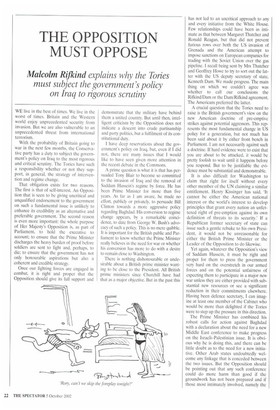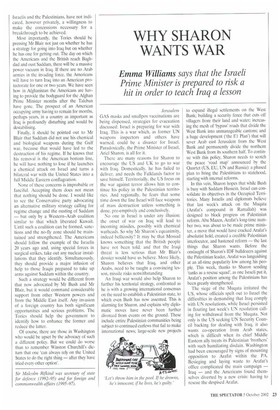THE OPPOSITION MUST OPPOSE
Malcolm Rifkind explains why the Tories
must subject the government's policy on Iraq to rigorous scrutiny
WE live in the best of times. We live in the worst of times. Britain and the Western world enjoy unprecedented security from invasion. But we are also vulnerable to an unprecedented threat from international terrorism.
With the probability of Britain going to war in the next few months, the Conservative party has a duty to subject the government's policy on Iraq to the most rigorous and critical scrutiny. The Tories have such a responsibility whether or not they support, in general, the strategy of intervention and regime change.
That obligation exists for two reasons. The first is that of self-interest. An Opposition that is seen to be giving uncritical and unqualified endorsement to the government on such a fundamental issue is unlikely to enhance its credibility as an alternative and preferable government. The second reason is even more important: the whole purpose of Her Majesty's Opposition is, as part of Parliament, to hold the executive to account; to ensure that the Prime Minister discharges the heavy burden of proof before soldiers are sent to fight and, perhaps, to die; to ensure that the government has not only honourable aspirations but also a coherent and credible strategy.
Once our fighting forces are engaged in combat, it is right and proper that the Opposition should give its full support and demonstrate that the military have behind them a united country. But until then, intelligent criticism by the Opposition does not indicate a descent into crude partisanship and party politics, but a fulfilment of its constitutional duty.
I have deep reservations about the government's policy on Iraq, but, even if I did not, there are many issues that I would like to have seen given more attention in the recent debate in the Commons.
A prime question is what it is that has persuaded Tony Blair to become so committed to the invasion of Iraq and the removal of Saddam Hussein's regime by force. He has been Prime Minister for more than five years. As far as I am aware, he made no effort, publicly or privately, to persuade Bill Clinton towards a more aggressive policy regarding Baghdad. His conversion to regime change appears, by a remarkable coincidence, to date from George W. Bush's advocacy of such a policy. This is no mere quibble. It is important for the British public and Parliament to know whether the Prime Minister really believes in the need for war or whether his conversion has more to do with a desire to remain close to Washington.
There is nothing dishonourable or undesirable about a British prime minister wanting to be close to the President. All British prime ministers since Churchill have had that as a major objective. But in the past this has not led to an uncritical approach to any and evety initiative from the White House. Few relationships could have been as intimate as that between Margaret Thatcher and Ronald Reagan, but that did not prevent furious rows over both the US invasion of Grenada and the American attempt to impose sanctions on European companies for trading with the Soviet Union over the gas pipeline. I recall being sent by Mrs Thatcher and Geoffrey Howe to try to sort out the latter with the US deputy secretary of state. Kenneth Dam. We made progress. The main thing on which we couldn't agree was whether to call our conclusions the Rifkind/Dam or the Dam/Rifkind agreement. The Americans preferred the latter.
A crucial question that the Tories need to raise is the British government's view on the new American doctrine of pre-emptive strikes against potential aggressors. This represents the most fundamental change in US policy for a generation, but not much has been said about it by either front bench in Parliament. I am not necessarily against such a doctrine. If hard evidence were to exist that you are about to be attacked, it would be pretty foolish to wait until it happens before you respond. But to be justifiable the evidence must be substantial and demonstrable.
It is also difficult for Washington to claim that right for itself without every other member of the UN claiming a similar entitlement. Henry Kissinger has said, 'It cannot be either the American national interest or the world's interest to develop principles that grant every nation an unfettered right of pre-emption against its own definition of threats to its security.' If a Republican former secretary of state can issue such a gentle rebuke to his own President, it would not be unreasonable for either the British Prime Minister or the Leader of the Opposition to do likewise.
Yet again, whatever the Opposition's view of Saddam Hussein, it must be right and proper for them to press the government very hard on the overstretch in our armed forces and on the potential unfairness of expecting them to participate in a major new war unless they are either provided with substantial new resources or see a significant reduction in their commitments elsewhere. Having been defence secretary, I can imagine at least one member of the Cabinet who would be more than delighted if the Tories were to step up the pressure in this direction.
The Prime Minister has combined his robust calls for action against Baghdad with a declaration about the need for a new Middle East conference to make progress on the Israeli—Palestinian issue. It is obvious why he is doing this, and there can be little doubt as to the need for a new initiative. Other Arab states undoubtedly welcome any linkage that is conceded between the two issues. But the Opposition should be pointing out that any such conference could do more harm than good if the groundwork has not been prepared and if those most intimately involved, namely the
Israelis and the Palestinians, have not indicated, however privately, a willingness to make the concessions necessary for a breakthrough to be achieved.
Most importantly, the Tories should be pressing Mr Blair not just on whether he has a strategy for going into Iraq but on whether he has one for getting out. The day on which the Americans and the British reach Baghdad and oust Saddam, there will be a massive power vacuum in Iraq. If there are no Arab armies in the invading force, the Americans will have to turn Iraq into an American protectorate for one or two years. We have seen how in Afghanistan the Americans are having to provide the bodyguard for the Afghan Prime Minister months after the Taleban have gone. The prospect of an American occupying army having to remain for months, perhaps years, in a country as important as Iraq is profoundly disturbing and would be destabilising.
Finally, it should be pointed out to Mr Blair that Saddam did not use his chemical and biological weapons during the Gulf war, because that would have led to the destruction of his regime. If he knows that his removal is the American bottom line, he will have nothing to lose if he launches a chemical attack on Israel and turns a bilateral war with the United States into a full Middle Eastern conflagration.
None of these concerns is improbable or fanciful. Accepting them does not mean that nothing should be done. I would like to see the Conservative party advocating an alternative military strategy calling for regime change and the ousting of Saddam — but only by a Western-Arab coalition similar to that which liberated Kuwait. Until such a coalition can be formed, sanctions and the no-fly zone should be maintained and strengthened. The Americans should follow the example of the Israelis 20 years ago and, using special forces in surgical strikes, take out any nuclear installations that they identify. Simultaneously, they should provide a major infusion of help to those Iraqis prepared to take up arms against Saddam within the country.
Such a strategy would be different from that now advocated by Mr Bush and Mr Blair, but it would command considerable support from other Western powers and from the Middle East itself. Any invasion of a foreign country has both significant opportunities and serious problems. The Tories should help the government to identify how to enhance the former and reduce the latter.
Of course, there are those in Washington who would be upset by the advocacy of such a different policy. But we could do worse than to remember Winston Churchill's dictum that one 'can always rely on the United States to do the right thing — after they have tried every other option'.
Sir Malcolm Rtfkind was secretary of state for defence (1992-95) and for foreign and commonwealth affairs (1995-97).





































































 Previous page
Previous page